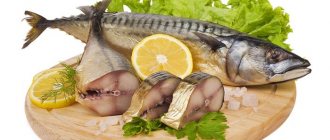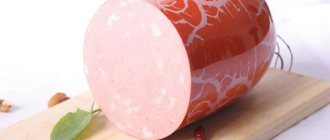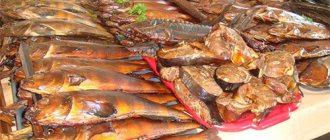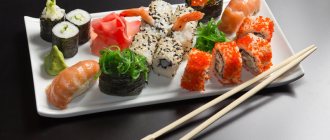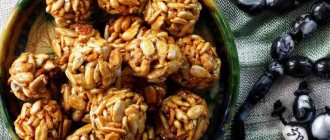The health of a breastfed baby directly depends on the mother’s diet, so nursing women should be especially careful when planning a daily menu.
At the same time, it is important for a nursing mother not only to provide her baby with all the necessary nutrients, but also to take care of her own body, which needs to recover after pregnancy and childbirth.
Products recommended for nutrition during lactation include white fish. This is a rich source of protein that is perfectly absorbed by the bodies of mother and baby. Mackerel (mackerel) is also a white fish; many tasty and healthy dishes are traditionally prepared from it. Can a nursing mother include them in her menu?
Beneficial features
If you carefully read the composition of the product, you can note that 100 g of mackerel fillet contains:
- up to 20 g of protein;
- 12-30 g fat;
- about 4.5 g of omega-3 (polyunsaturated fatty acids).
Quite fatty mackerel meat contains about 200 Kcal per 100 g. But the fat of this fish is completely absorbed by the human body - it is processed into vital amino acids and is a supplier of healthy cholesterol.
It is worth noting that a 100 g serving of mackerel contains half the daily protein requirement for an adult. This protein is required for muscle growth and for the proper functioning of many organs and systems.
Mackerel meat also contains micro- and macroelements, including iodine, which is necessary for the normal functioning of the thyroid gland. This fish is rich in vitamins and other beneficial substances that restore elasticity to the skin, make hair silky, and strengthen nails and teeth.
Magnesium, calcium, niacin, vitamin D make bone tissue stronger and have a beneficial effect on the nervous system, which is especially important for women during postpartum depression.
The lack of carbohydrates makes mackerel dishes dietary and healthy for nursing mothers who are trying to get rid of extra pounds gained during pregnancy and lactation due to poor nutrition or metabolic disorders.
The importance of Omega-3 fatty acids can hardly be overestimated - their consumption helps prevent diseases of the heart and vascular system, reduce the risk of blood clots, and improve blood circulation. Mackerel is a valuable commercial fish; the beneficial substances included in the product help strengthen the immune system.
Contraindications
Mackerel meat is a strong allergen, which makes it impossible to widely recommend the product for feeding nursing mothers, despite all its positive properties. Studies have shown that heat treatment does not reduce the allergenic properties of mackerel.
You can reduce the risk of allergies by consuming canned mackerel that has been vacuum dried at low temperatures. However, canned products are dangerous for babies, as chemicals pass into breast milk, and fish dried without high-temperature treatment causes food poisoning.
Mackerel causes a type of allergy against which antihistamines are powerless. Symptoms may appear 2 hours after consuming the product or several days later. In addition to skin rashes, indigestion, redness of mucous membranes, allergy symptoms can include sleep disturbance, increased fatigue, myocarditis and many other manifestations that are difficult to associate with eating fish.
Another danger of eating mackerel is that the meat of the marine fish may contain excessively high levels of mercury and other heavy metals. This is due to the environmental problems of the World Ocean. For this reason, a nursing mother should limit her consumption of mackerel and other sea fish.
Mackerel during breastfeeding - Mom's news
Every nutritionist will confirm that the basis of any healthy diet is vegetables, fruits, meat and fish.
It is the latter type of food that we will talk about today, or rather, about a fish like mackerel, which many mothers love to eat while breastfeeding, considering it completely safe. But is this so and is it really worth eating during lactation? Let’s look at these questions together.
Can a nursing mother eat mackerel and what are its benefits?
After childbirth, the female body’s need for nutrients and various microelements increases several times. This is due to the fact that part of a young mother’s internal reserves of nutrients is spent on milk production, and therefore a woman’s diet after childbirth should be both varied and balanced.
Mackerel, with all the beneficial substances in its composition, is an excellent product to include in the menu of a nursing mother. However, pediatricians recommend treating this fish with caution - the risk of a negative reaction in an infant is quite high, and therefore it is better not to eat this fish in the first months.
If later the tasting of the fish went smoothly, and the baby did not have any allergies, then you can fully introduce it into your diet and enjoy all the positive qualities. Fortunately, mackerel has a lot of them.
- Mackerel is rich in antioxidants - these substances help our body repair and renew cells. After giving birth, many women notice that their skin and hair lose their former beauty, but regular consumption of this fish will restore their condition. In addition, mackerel can be an excellent preventive remedy for various skin diseases.
- This fish contains very little vitamin C , but it also contains a unique coenzyme; together these compounds create a powerful combination that makes the immune system stronger, which is especially important for the baby’s still fragile body.
- Due to the fact that mackerel contains a significant amount of omega-3 fatty acids , eating it helps reduce cholesterol levels in the blood. This property helps reduce the risk of developing heart and vascular diseases.
- Antioxidants also help remove harmful and toxic elements from the body, the presence of which causes cancer.
- Mackerel is rich in calcium, manganese, magnesium and copper. This set of minerals makes this fish an excellent product for maintaining bone health. Also, these microelements partially reach the baby along with breast milk and help his body grow and develop more actively.
- Omega-3 fatty acids, which are present in significant quantities in mackerel, have a beneficial effect on the condition of the nervous system and brain. This feature is extremely important for a developing baby - children whose mothers regularly eat fish develop faster mentally and have higher intellectual indicators.
- Although mackerel itself is quite high in calories, it also contains a significant amount of protein . It is known to activate the digestive system and promote better metabolism in the body. Protein is also a kind of building material for the organs and entire systems of the baby, and therefore protein foods are especially recommended for nursing mothers.
- Mackerel contains iron . This microelement is actively involved in the processes of hematopoiesis and saturates our body with oxygen, so we can say that a normal level of iron in the body of a nursing mother contributes to better milk production and an increase in its volume.
- Mackerel will also be useful for those mothers who are predisposed to diseases such as diabetes. The substances in this fish help the body normalize blood sugar levels and maintain it.
Possible harm from eating mackerel while breastfeeding
Of course, mackerel has a lot of beneficial properties, but this fish also has several negative qualities, which is why it is not recommended to eat it in the first month after giving birth.
- Mackerel meat contains protein, which often causes allergies in infants.
- Also, eating mackerel by a nursing mother can cause digestive problems and increased gas production in the child.
- Salted mackerel, due to its high sodium content, retains water in the body and prevents its removal. For this reason, swelling may occur and blood pressure increases.
- The significant caloric content of fish can lead to weight gain, this is especially true for those young mothers who suffer from extra pounds after childbirth.
- Some carcasses may contain toxic substances; if you eat mackerel in excessive quantities, they will accumulate in the body, and will also partially pass into the milk, and then to the baby.
When can you try mackerel for the first time during breastfeeding and in what quantity?
Although mackerel has light meat, its introduction into the diet of a nursing mother should be postponed until the baby reaches at least 3-4 months of age. In terms of allergenicity, such fatty fish is comparable to red varieties, and therefore you need to treat it with the utmost caution.
https://www.youtube.com/watch?v=FRaUmu2AlZY
To begin with, try a very small amount of ready-made mackerel, eat it in the first half of the day so that you can freely observe the reaction of the baby. If no negative reaction occurs until the next day, then you can increase the portion.
It is allowed to eat mackerel no more than 2-3 times a week, and the daily norm is no more than 100 grams of fish fillet.
It should be remembered that the main symptoms of an allergic reaction are: rash, hives, redness and spots on the skin, difficulty breathing, cough, watery eyes, runny nose, change in stool consistency, colic and flatulence. If any of these occur in your baby, then stop eating mackerel immediately.
You can try again to introduce this fish into your diet after 1 month. By this time, the child will have grown up and his body will be able to adequately respond to the new product eaten by the mother.
Tips for choosing and consuming mackerel during lactation
- When choosing mackerel, pay attention to the eyes of the fish - they should be transparent and unclouded, and the smell from the carcass should be fishy, but not unpleasant.
- Fresh mackerel has dense and elastic meat that quickly returns to shape if you apply a little pressure with your finger.
- It is better to give up the canned product for a while - pediatricians do not recommend eating such fish during breastfeeding.
- It’s great if the mackerel is boiled or baked. This product retains its beneficial properties and is absolutely not harmful to health.
- You should not eat smoked and salted mackerel - in the first case, the risk of developing allergies increases several times, and the second version of the product contributes to the appearance of edema and fluid retention in the body.
So, mackerel during breastfeeding can be an excellent product that will bring many benefits to you and your baby.
The most important thing here is to observe moderation when consuming it and properly prepare the fish in order to preserve the maximum amount of nutrients.
: (Please rate the article) Loading...
Source: https://parents-news.ru/materinstvo/skumbriya-pri-grudnom-vskarmlivanii.html
Introduction of fish dishes into the diet
You can start including white fish in your menu a couple of weeks after giving birth. But not mackerel, you should choose the safest product from an allergy point of view.
You can try adding mackerel to the diet after the baby has adapted to other types of white fish (cod, pike perch, etc.), as well as red fish (pink salmon, sockeye salmon).
The mother should eat a piece of steamed mackerel after finishing her morning feeding. It takes at least two to three days to monitor his reaction. If no negative manifestations are noticed, the portion of fish can be increased to 100-150 grams.
Mackerel dishes
It is recommended that a nursing mother first introduce fish dishes prepared without frying into her menu. This can be mackerel in broth or steamed in a double boiler or slow cooker. Rice and vegetables make a tasty and healthy side dish that can be steamed.
If the baby is already 8-9 months old, you can cook fish for mom by baking it in foil or a bag. This dish retains a maximum of vitamins and nutrients, and there is no excess fat. And what can a baby eat at 8 months, see the article at the link.
You can try fried mackerel little by little when the child is one year old. At an earlier age, excess fat in breast milk and extractives lead to digestive disorders.
At home, mackerel is salted and pickled, but this product is contraindicated for nursing mothers, since it does not undergo heat treatment and contains a high amount of salt.
Canned mackerel is widely available on sale, and this fish is also sold smoked. All types of canned fish should be excluded from the menu during lactation, since there is no guarantee that they are of high quality and do not contain additives that are dangerous to the baby.
Smoked mackerel during breastfeeding is also not a recommended product, since when processing fish with real or liquid smoke, substances harmful to health, including carcinogens, enter the product.
A nursing mother can include healthy dishes made from fresh mackerel in the menu two to three times a month, if she and her baby are not allergic to this fish.
A serving can reach 200 grams. Subscribe to our VKontakte group
Can a nursing mother eat mackerel?
Fish should be given a special, honorable place in the diet of a nursing mother. After all, it is a supplier of easily digestible protein, healthy fats and microelements important for the body.
During breastfeeding, women should take care not only of their baby’s health, but also of their own. After all, after pregnancy and childbirth, the body needs recovery.
In this article we will look at whether it is possible for a nursing mother to include mackerel in her diet, and in what form it is best to consume it, and whether, for example, smoked mackerel is allowed.
Can it be used during breastfeeding?
It is highly recommended to include mackerel in the diet of nursing mothers , because this fish is rich in vitamin D, which promotes the absorption of calcium. This will benefit both the baby and the mother. However, doctors warn that mackerel should be treated with caution.
From what month?
Due to the fact that mackerel is an allergenic product, pediatricians do not recommend its consumption in the first months of feeding. In general, the white variety of fish is included a couple of weeks after birth.
Mackerel should be added when the baby has already adapted to other types of white fish. And no allergic reaction to them was detected. The best option would be to add mackerel to the diet when the baby is 3 months old.
Allowed cooking methods
It is best for nursing mothers to consume boiled and baked mackerel . The most useful option would be to cook in a double boiler - this method best preserves all the beneficial substances. You can also find many recipes for cooking mackerel in a slow cooker. Pediatricians strongly do not recommend consuming smoked mackerel during breastfeeding.
Smoked meats are strictly prohibited for nursing women. They are treated with liquid smoke, which is a strong carcinogen and can cause an allergic reaction in the baby.
Both in the case of smoked meats and in the case of spices, when they are consumed, breast milk may become unpalatable for the baby, and he will refuse to feed.
Salted mackerel is also not recommended . After all, this version of fish does not undergo heat treatment, which is why it is a potentially dangerous product.
The same applies to canned mackerel, which also has a high salt content.
Benefits for the mother
A very important property of mackerel is its ability to lower cholesterol in the blood. Due to the presence of Omega-3 fatty acids, its consumption in food has a positive effect on the cardiovascular system.
- Mackerel is rich in antioxidants, which have a pronounced rejuvenating effect on the body, helping to remove toxins.
- This fish helps maintain bones, teeth and hair in good condition, because it is rich in calcium, magnesium and copper. Microelements are supplied in sufficient quantities to the baby through milk.
- An easily digestible protein that improves metabolism in the body.
- The high iron content in this type of fish has a beneficial effect on women's health. It is very important that the mother has a normal level of iron in the blood, as this contributes to better milk production.
Is it allowed in baby food?
Pediatricians have differing opinions on this issue. As a fish supplement, mackerel is too heavy , as it contains a lot of fat. Its ability to accumulate mercury and high allergenicity do not allow this fish to be used in the early years of a baby’s life. The load on the liver will be too high.
When can it be included in the diet?
After feeding meat, they usually start eating fish. Pediatricians recommend it for babies from 10 or 11 months of age.
But the baby may not try mackerel any time soon. The first varieties with which it is usually recommended to start complementary feeding are cod, hake, and pollock .
But fatty varieties, including mackerel, are recommended to be given after reaching 3 years of age. Fried and smoked mackerel can also be offered when the child is over 3 years old.
Preferred cooking methods
Boiled and baked mackerel is most useful. Retaining all the substances and microelements, this cooking option does not harm the health of mother and baby. Mackerel can also be stewed with vegetables, without adding salt or seasonings. Frying mackerel is not recommended, as this processing option is the most carcinogenic.
Benefits for the baby
Mackerel contains beneficial Omega-3 fatty acids , which contribute to the normal formation of the nervous system and brain. Also, they increase the child's mental abilities. Vitamin D helps improve the absorption of calcium, which promotes good development of the skeletal system.
What is dangerous for mother and baby?
Mackerel has a lot of beneficial properties, but this fish is quite allergic. And heat treatment does not reduce its allergenic properties.
It is the protein contained in mackerel that most often causes allergic reactions.
- Due to the high salt content in its composition, mackerel often provokes swelling and retains water in the body of a nursing mother.
- Mackerel is toxic because it can accumulate mercury and heavy metals. The conditions in which it was grown significantly affect the quality of the product.
How to choose and what to pay attention to?
It is better for nursing mothers to buy fresh rather than frozen fish . Since the number of frosts and defrosts, as a rule, is almost impossible to track.
- It is worth paying attention, first of all, to the elasticity of the fish - fresh mackerel should not fall apart or be damaged. Elasticity is the first sign of freshness.
- The presence of a yellowish tint (oxidized fat) and darkened gills indicate that the product is not fresh.
- The fish's eyes should be transparent.
Next, we suggest watching a video on how to choose this fish:
Recommendations for use during lactation
Mackerel should be included in your diet when you have already tried fish such as cod, pollock and pike perch. From the third month of feeding, mackerel can be gradually introduced into the diet. At the same time, monitor the baby’s health. If a negative reaction occurs, you should stop eating this fish.
How to properly introduce it into the diet?
First you need to try a very small piece of prepared mackerel , it is better to eat it in the morning. If the baby does not have an allergic reaction within two days, the portion can be increased.
Nursing mothers are advised to consume mackerel no more than 2-3 times per week and no more than 100 grams at a time. In the future, the portion can be increased to 200 grams.
As we found out, mackerel can, and even should, be included in the diet of a nursing mother . This fish perfectly restores strength, saturates the body with vitamin D and Omega-3 fatty acids, which benefit both mother and baby. The main thing is to introduce it into the diet gradually, carefully monitoring the baby’s condition.
The method of cooking is also important; the healthiest option is baked and boiled mackerel, but it is better to avoid smoked and salted mackerel.
Kids and their problems
Source: https://imother.su/beremennost/mozhno-li-skumbriyu-est-kormyashhej-mame.html
